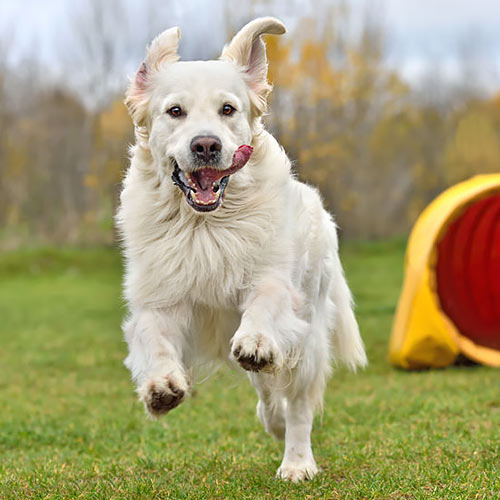Classes begin at 9am. Lunch break is usually 12-1. Some students drive into Spencer for a quick lunch at local restaurants. Others eat on-site and/or work on homework. Lunch time is also another opportunity to give the dogs a break. Class typically dismisses give/take 4pm, depending upon class size, weather, type of dogs to be trained that day, etc. A typical day (if it can be said there is such a thing lol) is to have a minimum of two hands-on training sessions each day. Some days include classroom instruction. Some days some courses will meet off-site at other training venues. Due to the nature of training dogs, students can expect to walk/jog/run in varying distances, with working dog courses demanding more physical endurance.
There will be homework assignments and tests to study for. Some students work a part-time job after classes dismiss. There are also some state parks and several hiking trails nearby as well as abundant entertainment options in Bloomington, IN, a half hour away.
Upon completion of the courses offered, the student will be equipped to perform effectively and professionally in their respective field/s of study. These courses are far more than a surface education. They get into the “nuts and bolts” of dog training so the graduate will be informed of the issues involved and react proficiently. Most of the courses will educate the student on successfully creating and marketing his/her own business. Certification/s received will be a valuable impetus in the minds of prospective clients and, if marketed as taught in class, will repay your tuition many times over. For a sketch of individual course expectations, please visit that course’s description in the drop-down menu under the “Dog Trainer Courses” tab.
Certification for dog trainers is much like it is with those in other fields: nursing, EMTs, attorneys, heavy equipment operators, etc. It proves that you are qualified to do the tasks you claim you can do. Certification in the field of dog training is an increasingly important demand. So many poor trainers are out there parading around as professionals that it takes more than a “I’m a trainer” to convince clients of your authenticity. Certification…
- gives veracity to your claim of professionalism.
- proves you know what what you’re doing as a trainer. Certification is only earned after learning correct training techniques and many hours of applied practical training experience.
- attracts clients. They tend to steer clear of those who do not have the education to back up their claims.
- better prepares you to answer your clients questions. You will learn far more about canine behavior than most people ever dreamed of.
- substantiates your skills. Certification from a hands-on institution will far outweigh those received from cheap online courses. Dog training is more than reading a book or listening to a podcast. Dog training is hands-on, baby!
- pays for itself. Again and again.
Furthermore, receiving your certification from a nationally recognized school provides further evidence of your skills. The Dog Trainer College has served students across the US and internationally. When potential clients realize you’ve graduated from a reputable school as the Dog Trainer College, it gives a boost in their opinion of you and is a powerful motivator for them to come your direction.
Certainly. There may be some review, depending upon the depth of your current knowledge. However, we have had students from other trainer schools attend our courses and learn far more than was received elsewhere (this is their words, not ours). Our instruction gives the student a wealth of information necessary to be competent in his/her field and operate at the height of his/her potential. Some of the advanced courses will require the student to have some background in training (at least the equivalent of our Behavior and Obedience course).
No training experience is necessary. Our foundational course – Canine Behavior and Obedience – is designed to begin with the basics and mold the student into a certified trainer. Students who take their studies seriously and apply themselves will have little-to-no trouble grasping and implementing the concepts given. Some of the advanced courses will require the student to have some background in training. However, most of our advanced courses also include the Behavior and Obedience course in order to set a solid foundation for proficient training methods.
The student will need be able to communicate clearly in English – speaking, reading, and listening – follow directions, read books/hand-outs/assignments, be able to take written tests and hands-on tests as well as take class notes. The classroom is accessible by wheelchair, walker, and/or crutches. Furthermore, a student enrolling in our courses must be able to:
- Attach and detach animal training collars and leashes.
- Grasp and hold a leash, controlling small, medium and large dogs.
- Be able to reach above and below shoulder height with both hands.
- Be outdoors in various weather conditions.
- Operate at a brisk pace.
- Lift up to 40 lbs.
- Carry up to 20 lbs.
- Physically restrain large dogs.
- Hear normal conversation up to 100 feet away and in close proximity to others.
- Students in courses that include decoy/helper skills must be able to take bites from a dog in various settings.
- Walk, jog, run for varying distances in varied terrain.
- Mentally capable of multitasking, test-taking, and receiving instructions.
- Communicate clearly in English.
The grading system is geared towards 30% bookwork, lecture, tests, training theory and 70% hands-on training, final exam, and testing. Students who complete the course with a 94-96% receive a Merit Certificate. Students who complete the course with a 97-100% receive an Honor Certificate.
Yes, each student may bring up to 2 dogs of their own. Each student has the option of training their own dogs during the course. This is a win-win situation for both students and their dog/s. The minimum age requirement is at least 8 weeks old. They must be current on vaccinations, are not required to be altered, and there are no breed restrictions. These dogs can be trained as far as you can take them during the course. In fact, some students in working dog courses bring along a dog to train and sell thereafter, which pays for some or all of their tuition. Students are to be responsible for the actions of their dogs while on campus. For those who do not bring their own dogs, we will have eager participants available to train during the course.
Your dogs may lodge on-site in our climate-controlled kennel, as space is available, or in roomy outdoor runs, as needed. Students will be responsible for any damages caused by their dog/s.
Travel trailer. Hickory Hills campground, a 10 minute drive from DTC, is a beautiful country setting which several students have utilized. They have some outstanding positive raves. It’s remote, quiet, relaxing, and students who have stayed there say it is a very nice side-benefit of attending school here. McCormick’s Creek State park also has trailer spaces available.
AirBnB has several houses in the area; availability and pricing varies.
Rental cabins are available at Hickory Hills campground and McCormick’s Creek State Park.
We have also worked out a weekly and/or monthly rate with several motels in the area, ranging from 10-20 minutes away from the school. The most pet friendly motel is Motel 6 in Cloverdale. This is a nice, clean Motel 6 with friendly staff. Other motels are Super 8, Econolodge. and Holiday Inn. The Patriot Inn in Spencer does not allow pets.
The average class size is 9 students, however some semesters have more or less. We do strive to keep the class size small so that each student receives the interaction and oversight of an experienced instructor. We also want to be available for plenty of healthy question/answer time as needed. Our goal is to teach correct methods of training thereby preventing problems before they arise. Constructive oversight is needed – and typically desired – by students.
The College is located 5 miles north of Spencer, Indiana. Independent lodging options are available for those outside the immediate area. The College is situated in a rural setting, which is advantageous to the many different types of training we offer. Off-site locations are employed as needed, especially for those needing additional tracking/trailing, service dog, and/or K9 patrol experience. We also have access to over 1000 acres of training ground as well as warehouses and other buildings to train in.
Yes, we have financing through the Tuition Financing Corporation, an independent financing institution specializing in student tuition costs. Based in part on credit score. Competitive rates. Typically there is a down-payment and the enrollment application deposit of $200. Contact us for current rates, length of terms, etc. Those wishing to utilize this financing option must be pre-approved before classes begin. Deadline for financial aid applications is two weeks prior to the course you are enrolling in.
We no longer accept the GI Bill ™ or other VA education benefits. We apologize for this inconvenience to our veterans but we can no longer tolerate the crass incompetence of the VA.
Currently, our lead instructor is Tim Miller (CMDT), training director of Conifer Canine LLC. With over 30 years of training experience, Tim’s input is progressive, relevant, and often entertaining. Samantha Kendrick (K9I) is also one of our Instructors. She has trained her bully breeds and others as well. Samantha aims high in her trainer skills! Guest speakers are also a part of most of our courses, including, but not limited to, K9 officers, veterinarians, K9 detection teams, and humane society directors. Additionally, Dr. Denise Farrar (DVM) instructs in canine first aid, and the prevention and treatment of canine-related concerns. Dr. Farrar has a highly-recommended veterinary practice in Spencer, IN, the Town and Country Veterinary Clinic.
Each course is in session from approximately 9am to 4pm Monday through Friday, meeting at our Training Center at 717 Beaver Hollow Rd, Spencer, Indiana. Much of the hands-on learning is held outdoors as well as inside our 4000 square foot training facility. Most lectures are held indoors. The working dog courses also meet off-site occasionally. We offer a flexible schedule of three semesters per year, beginning in the first week of March, July, and October. Classes are dismissed for major US holidays. Some classes meet off-site for training on some days and may require some driving.
The payment for your tuition is due on the first day of class. Master Trainer students (due to the length of the class and size of tuition) can make two equal payments: one of the first day of class with the second payment being made half way through the course. This is the case unless prior financing arrangements have been made. The application fee is non-refundable however it is applied toward the tuition when the applicant shows up for class. Refunds for withdrawal or dismissal will be given on a pro-rated basis only.

